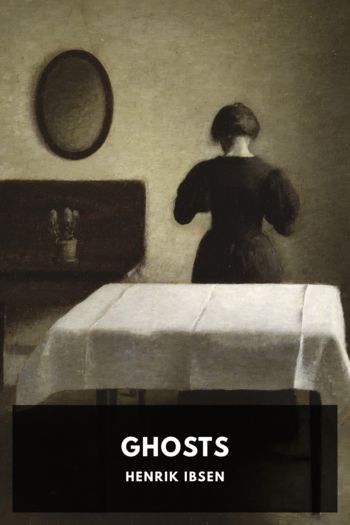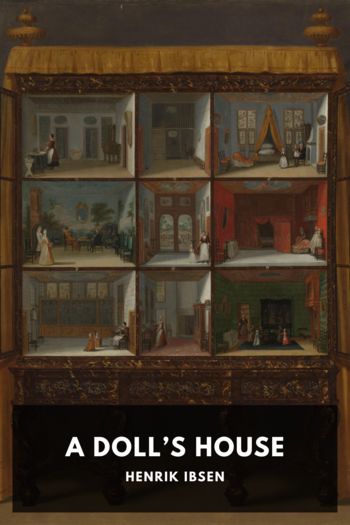Ghosts by Henrik Ibsen (best novels of all time .TXT) 📕

Description
Written in 1881, when melodrama and farce were still at their peak of popularity, Ibsen’s Ghosts is a three-act tragedy that explores uncomfortable, even forbidden themes. It is also a highly critical commentary on the morality of the day. The play centers around the widow of a prominent Norwegian sea captain whose son returns home and, with tragic consequences, revives the ghosts of the past that she has long labored to put to rest.
Ghosts immediately became a source of controversy for its inclusion of topics like venereal disease, incest, and euthanasia, and it was banned from being performed in England for many years. Its arrival signals a shift in the nature of theatre and, despite negative criticism, it was translated into other languages and performed in Sweden, Germany, and New York within a few years of its debut. It stands now as one of the works considered to have ushered in the era of modern drama.
Read free book «Ghosts by Henrik Ibsen (best novels of all time .TXT) 📕» - read online or download for free at americanlibrarybooks.com
- Author: Henrik Ibsen
Read book online «Ghosts by Henrik Ibsen (best novels of all time .TXT) 📕». Author - Henrik Ibsen
Must we, then, wholly dissent from Björnson’s judgment? I think not. In a historical, if not in an aesthetic, sense, Ghosts may well rank as Ibsen’s greatest work. It was the play which first gave the full measure of his technical and spiritual originality and daring. It has done far more than any other of his plays to “move boundary-posts.” It has advanced the frontiers of dramatic art and implanted new ideals, both technical and intellectual, in the minds of a whole generation of playwrights. It ranks with Hernani and La Dame aux Camélias among the epoch-making plays of the nineteenth century, while in point of essential originality it towers above them. We cannot, I think, get nearer to the truth than Georg Brandes did in the above-quoted phrase from his first notice of the play, describing it as not, perhaps, the poet’s greatest work, but certainly his noblest deed. In another essay, Brandes has pointed to it, with equal justice, as marking Ibsen’s final breach with his early—one might almost say his hereditary romanticism. He here becomes, at last, “the most modern of the moderns.” “This, I am convinced,” says the Danish critic, “is his imperishable glory, and will give lasting life to his works.”
—William Archer
Dramatis PersonaeMrs. Helen Alving, widow of Captain Alving, late Chamberlain2 to the King.
Oswald Alving, her son, a painter.
Pastor Manders
Jacob Engstrand, a carpenter.
Regina Engstrand, Mrs. Alving’s maid.
The action takes place at Mrs. Alving’s country house, beside one of the large fjords in Western Norway.
Ghosts A Family-Drama in Three Acts Act IA spacious garden-room, with one door to the left, and two doors to the right. In the middle of the room a round table, with chairs about it. On the table lie books, periodicals, and newspapers. In the foreground to the left a window, and by it a small sofa, with a worktable in front of it. In the background, the room is continued into a somewhat narrower conservatory, the walls of which are formed by large panes of glass. In the right-hand wall of the conservatory is a door leading down into the garden. Through the glass wall a gloomy fjord landscape is faintly visible, veiled by steady rain.
Engstrand, the carpenter, stands by the garden door. His left leg is somewhat bent; he has a clump of wood under the sole of his boot. Regina, with an empty garden syringe in her hand, hinders him from advancing. Regina In a low voice. What do you want? Stop where you are. You’re positively dripping. Engstrand It’s the Lord’s own rain, my girl. Regina It’s the devil’s rain, I say. Engstrand Lord, how you talk, Regina. Limps a step or two forward into the room. It’s just this as I wanted to say— Regina Don’t clatter so with that foot of yours, I tell you! The young master’s asleep upstairs. Engstrand Asleep? In the middle of the day? Regina It’s no business of yours. Engstrand I was out on the loose last night— Regina I can quite believe that. Engstrand Yes, we’re weak vessels, we poor mortals, my girl— Regina So it seems. Engstrand —and temptations are manifold in this world, you see. But all the same, I was hard at work, God knows, at half-past five this morning. Regina Very well; only be off now. I won’t stop here and have rendezvous’s3 with you. Engstrand What do you say you won’t have? Regina I won’t have anyone find you here; so just you go about your business. Engstrand Advances a step or two. Blest if I go before I’ve had a talk with you. This afternoon I shall have finished my work at the schoolhouse, and then I shall take tonight’s boat and be off home to the town. Regina Mutters. Pleasant journey to you! Engstrand Thank you, my child. Tomorrow the Orphanage is to be opened, and then there’ll be fine doings, no doubt, and plenty of intoxicating drink going, you know. And nobody shall say of Jacob Engstrand that he can’t keep out of temptation’s way. Regina Oh! Engstrand You see, there’s to be heaps of grand folks here tomorrow. Pastor Manders is expected from town, too. Regina He’s coming today. Engstrand There, you see! And I should be cursedly sorry if he found out anything against me, don’t you understand? Regina Oho! is that your




Comments (0)